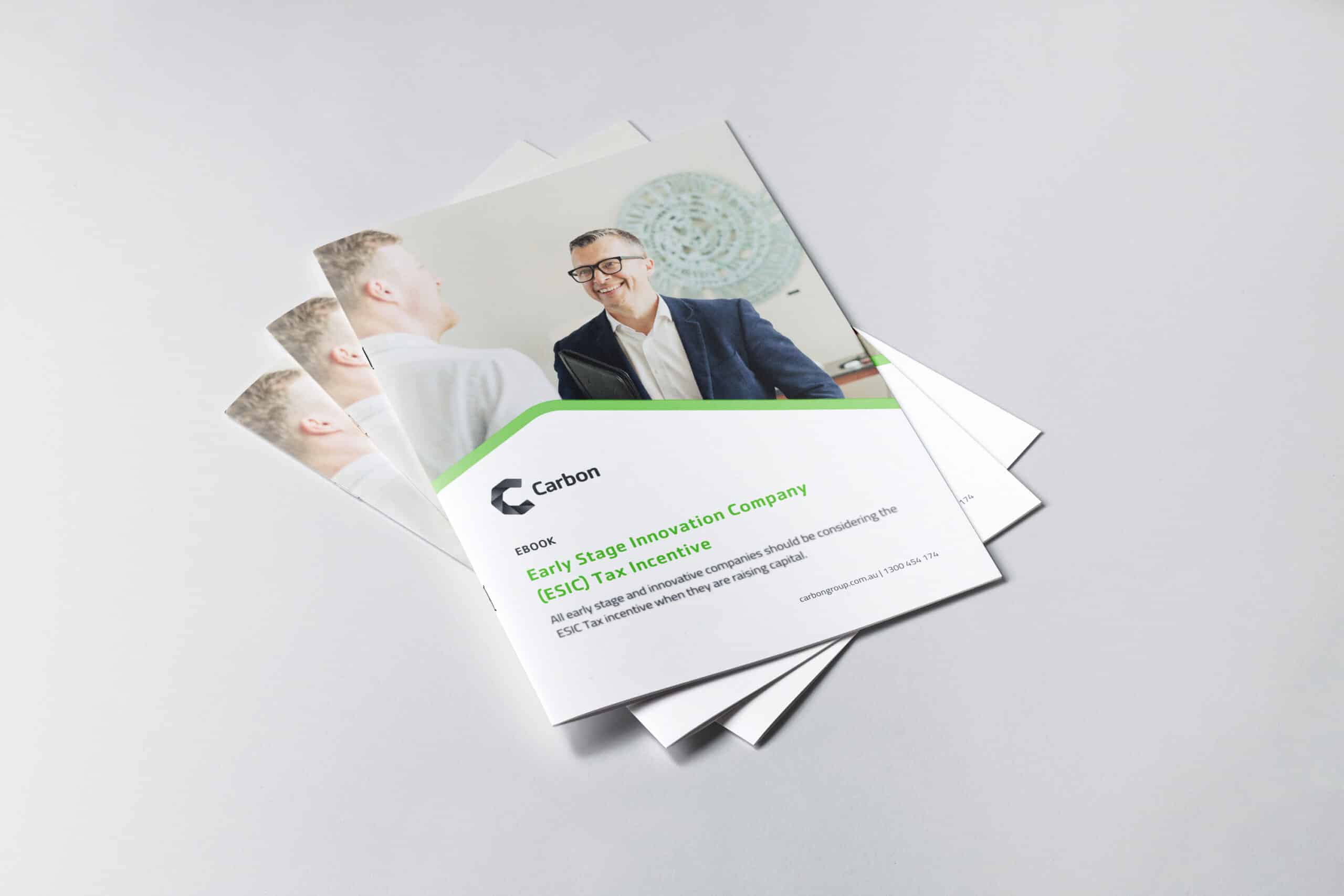The Early Stage Innovation Company (ESIC) tax incentive is possibly one of the most generous, yet least known tax incentives available in Australia. This tax offset was designed to encourage risk-taking investors to connect with early stage innovation companies (ESICs), providing them with the much-needed capital in the early stages of their businesses.
ESIC is worth considering for any early stage companies that are raising capital in the first 3 years of business.
If you invest in a qualifying ESIC, you may be eligible for the tax incentives for early stage investors (sometimes referred to as ‘angel investors’).
Table of Contents
What’s the ESIC tax incentive?
Broadly, ESIC is a tax incentive to encourage investment in early stage innovation companies with high-growth potential. Although legislated in July 2016, the ESIC incentive is still not widely understood.
ESIC status (for the company) offers investors two incentives:
- A non-refundable carry forward tax offset equal to 20% of the amount paid for their eligible investments. This is capped at a maximum tax offset amount of $200,000.
- Modified capital gains tax (CGT) treatment, under which capital gains on qualifying shares that are continuously held for at least 12 months and less than 10 years may be disregarded. Capital losses on shares held less than 10 years must be disregarded.
It’s important to note that:
- There’s a $50K investment limit for non-sophisticated investors.
- There’s a $1M investment limit for sophisticated investors.
- The company must report its ESIC status by 31 July following the year it issues its shares.
For investors
Early stage investors are people and companies who provide start-up businesses funding for their projects, typically when these projects are just beginning and are still in the market research or development stages.
An early stage investor must meet either the:
- ‘Sophisticated investor’ test under the Corporations Act 2001, or
- Their total investment in ESIC must be $50,000 or less for that income year.
Sophisticated investors
An investor may be considered a sophisticated investor if:
- They hold a certificate issued by a qualified accountant confirming certain asset and income requirements (gross income of at least $250,000 for the last two years and net assets of $2.5 million)
- They pay $500,000 or more for the shares
- They access the shares through a financial services licensee who is satisfied that the investor has sufficient previous experience and the investor signs an acknowledgement
- They are a ‘professional investor’ under the Corporations Act, or
- They control gross assets of $10 million or more.
For Early Stage Innovation Companies (ESIC)
A company will qualify as an ESIC if it is not a foreign company and meets:
- The early stage test; and
- Either the:
Early stage test
For the early stage part, the company must meet four requirements, which are:
- Your company must be incorporated or registered on the ABR (Australian Business Register)
- Your company’s (plus any wholly owned subsidiaries) expenses did not exceed $1 million in the previous income year
- Your company’s (plus any wholly owned subsidiaries) income did not exceed $200,000 in the previous income year, and
- Your company’s equity interest is not listed in the official list of any stock exchange in Australia or abroad.
Innovation tests
For the next part, the company must meet an innovation test (either the 100-point test or principles test). If you need help determining which innovation test is best for your industry and project, speak to an R&D specialist.
100-point innovation test
- To qualify for the 100 point innovation test, the company must obtain at least 100 points by meeting certain objective innovation criteria. This is tested immediately after the relevant shares are issued to the investor (test time).
- Points are assigned as follows:
Points |
Criteria |
|---|---|
| 75 points | At least 50% of the company’s total expenses for the previous income year are eligible for the R&D tax incentive. |
| 75 points | The company has received an Accelerating Commercialisation Grant at any time. |
| 50 points | 15% to 50% of the company’s total expenses for the previous income year are eligible for the R&D tax incentive. |
| 50 points | The company has completed or is undertaking an eligible accelerator program that provides time-limited support for entrepreneurs with a start-up business. |
| 50 points | One or more investors have already invested at least $50,000 in the company and ○ The third party was not an associate of the company immediately before it was issued with the shares; ○ The third party did not purchase those shares primarily to assist another entity to become entitled to the ESIC incentives; and ○ The company issued the shares at least one day before the test time. |
| 50 points | A company has enforceable rights on an innovation through: ○ A standard patent granted in Australia in the last five years ○ A plant breeder’s right that has been granted in Australia in the last five years, or ○ An equivalent intellectual property right granted in another country in the last five years. |
| 25 points | A company has enforceable rights on an innovation through: ○ An innovation patent granted in Australia in the last five years ○ A design right granted in Australia in the last five years, or ○ An equivalent intellectual property right granted in another country in the last five years. |
| 25 points | Has engaged a University or research provider to co-develop and commercialise. |
Source: Australian Taxation Office
Principles-based innovation test
There are five requirements of the principles-based test:
- The company must be genuinely focused on developing one or more new or significantly improved innovations for commercialisation.
- The business has high growth
- The company has the potential to be able to successfully scale up.
- The company has the potential to address a broader than local market, including global markets.
- The company has the potential to be able to develop a competitive advantage for that business.
The ESIC assessment process
There are three levels of comfort a company can obtain regarding ESIC:
- Seek a Private Biding Ruling from the ATO
- Note – this is only available using the principles-based innovation test
- This is the gold standard – cannot be challenged in later years
- Seek an advisor comfort letter
- Self-assess.
As illustrated above, there are a range of different options to consider when investigating ESIC status. The timing of the capital raise, the level of comfort investors are seeking and the prior year’s company activities (in particular R&D tax) are all critical factors. If you work with an accountant that specialises in R&D and Grants, they may be able to help you identify when ESIC status is worth pursuing.
Get help from an R&D and Grants professional
The ESIC tax incentive provides great benefits for both early-stage companies and investors wanting to invest in early-stage companies. Our R&D and Grants experts can assist both investors and companies to determine whether they are eligible for the ESIC tax offset. We can help clients navigate the complexities of the scheme and provide reassurance through every step of the application process. Get in touch with our team today to discuss how we can help.
Source: Tax incentives for early stage investors, Australian Tax Office
Early Stage Innovation Company (ESIC) Tax Incentive
All early stage and innovative companies should be considering the ESIC Tax incentive when they are raising capital.
Download our eBook for free!























